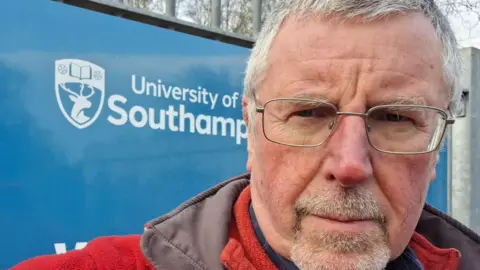Study probes effect of abuse trials on jurors
 Stephen Hanvey
Stephen HanveyThe emotional effects on jurors who sit through child sexual abuse trials is set to be investigated.
Research has shown that jurors are susceptible to symptoms such as intrusive thoughts and difficulty sleeping, as a result of what they see and hear during their service.
Stephen Hanvey, a PhD student at the University of Southampton, is carrying out a study into the experiences of those sitting on a jury in abuse cases.
A pilot scheme currently offers counselling to jurors in 15 crown courts in England and Wales.
Mr Hanvey is asking for volunteers to take part in the study involving a 45-minute anonymised survey and optional confidential interview.
He said he hoped the research could help in coming up with a more "trauma-informed approach" to supporting people during and after jury service.
The study will cover England, Wales and Scotland.
Other research, published by the British Journal of Clinical Psychology in 2024, suggests that having experienced trauma in the past can worsen the stress of viewing graphic evidence during jury duty.
Another paper, published in 2016 in the Journal of Criminal Justice, which reviewed 18 studies, found that up to 50% of jurors can experience trauma-related symptoms.
Mr Hanvey previously worked for five years in the witness service in Winchester and Southampton crown courts, where he helped to look after victims and witnesses preparing to give evidence.
He said he has heard in the past from multiple people who served on child sexual abuse trials about how it affected them.
"One person I know of - a young woman - when she saw children were being disbelieved, it reminded her of the way she was disbelieved when she was a child, trying to tell someone about her own abuse.
"That threw her back into a level of stress that she found deeply uncomfortable," he said.
Mr Hanvey said that the fact jurors are regularly reminded in court not to discuss a trial can mean they feel unable to talk about the emotional impact it has had - even after the trial has ended.
"They can't talk about the deliberation process, and what anybody said," said Mr Hanvey. "But they can talk about their broader experience."
In England and Wales, jurors - unlike judges - are not generally eligible for counselling.
A pilot scheme was launched in October across 15 crown courts in England and Wales, offering up to six free counselling sessions and a 24/7 helpline to jurors.
The Ministry of Justice said that the pilot would be reviewed before any further decisions are made.
